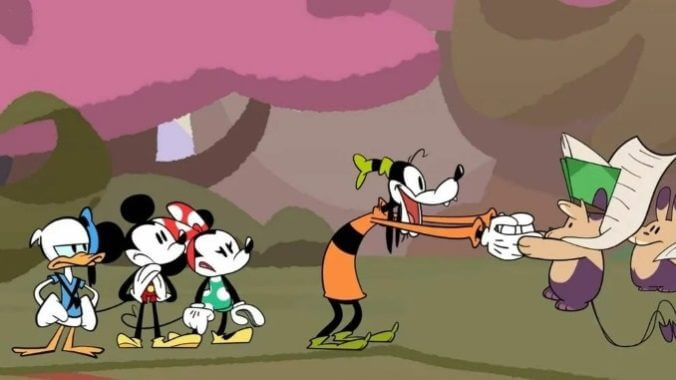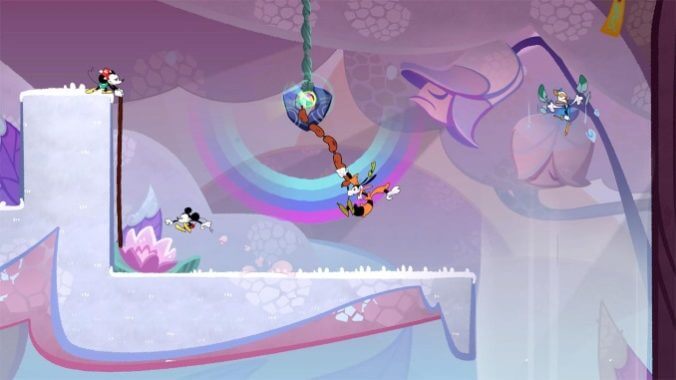Mickey Mouse Goes Metroid in Disney Illusion Island

There are a lot of things I like in this world, and near the top of that list you’ll find Metroid and classic Disney animation. So you’ll excuse me for being invested in Disney Illusion Island from the second it was announced. From the start Dlala’s game promised to unite the two, with a dash of New Super Mario Bros. Wii-style multiplayer action, to boot. Imagine a game where you and up to three friends can play as Mickey, Minnie, Donald, and Goofy as you explore a puzzling world that requires you to regularly backtrack and search for new paths, and you’ll have a handle on what Illusion Island was pitching.
Fortunately the game holds up its end of that bargain. Disney Illusion Island, which comes out tomorrow for the Switch, has the exploratory intrigue of a Metroid and the whimsical charm of a Disney cartoon short. It’s unsurprisingly suited for younger players, so don’t expect a great challenge—it’s less hard than thorough—but it has enough of that retraversal appeal to keep me happily playing for close to 10 hours. And yes, it does help that I got to play as Donald Duck throughout.
Beyond the Disney trappings, what sets Illusion Island apart from most Metroid tributes is that it doesn’t have traditional combat. You can’t directly attack anybody in this game. It’s teeming with weird creatures trying to hurt you, and your only recourse is to evade and avoid them. That means the series of power-ups you’ll gradually unlock are all motion-based, with no weapons of any kind. That might limit the gameplay options somewhat, but it’s also in keeping with the nature of these characters, who aren’t exactly the type of cartoon critters itching to murder anybody. Focusing entirely on motion gives the game a unique angle, and it makes the most of it, with several ways to traverse its sprawling world. You’ll progress from double jumps to swimming to grappling hooks to levitating, and eventually will have to combine all of that (and more) together to survive. It can eventually get complicated trying to string Illusion Island’s different kinds of motion together to move safely through its world, but losing that balance between movement and combat does remove a lot of the tension that defines these games; I’ll let you decide if that’s a problem or not. For me, though, the lack of combat is initially refreshing but eventually keeps the game from hitting a higher register. It does make perfect sense narratively and for this set of characters, but it also keeps Illusion Island from reaching the heights of the best Metroid games.
Given it’s 2023, the art style and character models are based on the current, modern take on Mickey and his pals. It can be a divisive aesthetic, one that tries to tap into the more anarchic early days of the Disney shorts from the ‘20s and ‘30s, but with an art style that resembles ‘90s Nickelodeon cartoons like Ren & Stimpy or Spongebob Squarepants. There’s also some flattening of the core four’s character traits; Goofy is still goofy, but he’s now food-obsessed above all else, whereas Donald is a cynical, grumpy jerk, and not a generally well-meaning duck with bad luck and a worse temper. I’m not sure if that characterization comes from the modern shorts, too, but given that series is a decade old at this point, and has taken up root in Disney games and on Disney theme park rides, it’s safe to say it’ll probably stick around for a while. Hopefully you can handle that.
